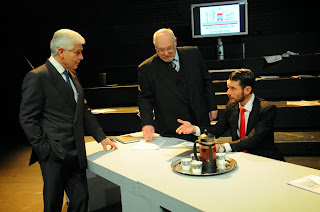William Shakespeare
Directed by Nick Hastings
★★★
Pros: The technical elements, including the music, sound effects, lighting and use of film are well crafted, and perfectly managed.
Cons: Some of the cast sound like they are reciting lines, and not performing them. There is also an overuse of actions and hand gestures to try and convey meaning of the words.
Our Verdict: This interpretation of Macbeth is very clear, and is intelligently applied to the story. However, it is questionable whether such a concept managed to keep the audience entertained.
 |
| Courtesy of Infinite Space Theatre |
This modern take on Macbeth is set in a bank. Ambitions to be king, has been replaced with climbing the corporate ladder. Scotland is now ‘The Royal Bank of Dunsinane’. King Duncan is the Chairman/CEO. Macbeth is the Head of Equities. His wife, Lady Macbeth is the Operations Director. And the three ‘double double, toil and trouble’ witches, are tabloid journalists.
It is clear a lot of effort has gone into developing this concept, and establishing the contemporary setting. Upon entering the theatre, there is a screen televising news about the Dunsinane bank rejecting a takeover bid. This ‘live’ broadcast, complete with ticker, is cleverly produced, and along with the front-page news stories printed in the program, make for quite a convincing and polished interpretation of William Shakespeare’s tragedy.
However it seems the office environment does not really lend itself to the stage, or particularly to this form of theatre. Shakespeare’s plays are known for testing the stamina and concentration of an audience, particularly because of the language. It is easy to lose track of what is happening, and become disinterested. Unfortunately, this production’s corporate and grey interpretation does little to counterbalance this obstacle.
The music, sound effects, lighting and use of film were very effective, and perfectly managed. Not one cue missed. The other stagecraft, including costumes and set were less inspired. The constant set changes interrupted the flow, and were kind of unnecessary. The four boxes and two tables created a blank canvas; they didn’t need to be moved to signify new settings.
In terms of performances, the stand out was Lady Macbeth (Danielle Stagg). She was every part the power-bitch for most of the play, making her final scene, where she’d gone mad with guilt all the more haunting.
The rest of the cast tried hard – perhaps too hard – to convey the meaning of their words. At times it was like watching a troupe of mime artists. Almost every line had an action; clenching a fist, taking a sip, hitting the table, standing up, sitting down, walking away, walking back, hitting the table again. It was then so refreshing when Malcolm (Thom Petty), in the scene where he and Macduff plan to go to the Dunsinane to challenge Macbeth, just sat down, didn’t move and spoke the words. There was an honesty and depth to Malcolm’s delivery, which proves sometimes less is more.
Macbeth (Steven Maddocks) was impressive. The scene where he imagines the dagger in his hand was very engaging. I couldn’t take my eyes off the invisible weapon. However, unlike Malcolm and Lady Macbeth, I don’t think he inhabited the role as deeply, and some of the scenes were overacted. It is a demanding role though, and I think the actor handled it well.
Macbeth is often referred to as The Scottish Play. According to theatrical superstition, speaking the name Macbeth inside a theatre will cause a disaster. This production was not a disaster by any means, but I don’t think the central concept did the story justice.
Please feel free to leave your thoughts and opinions in the comments section below!
Macbeth runs at The Cockpit until 26th October 2013.
Box Office: 020 7258 2925 or book online at www.thecockpit.org.uk/show/macbeth
 Everything Theatre Reviews, interviews and news for theatre lovers, London and beyond
Everything Theatre Reviews, interviews and news for theatre lovers, London and beyond


